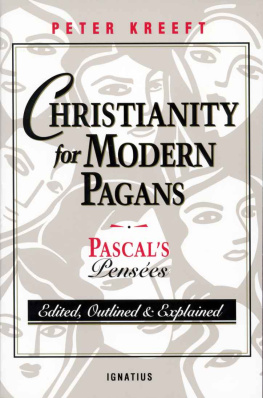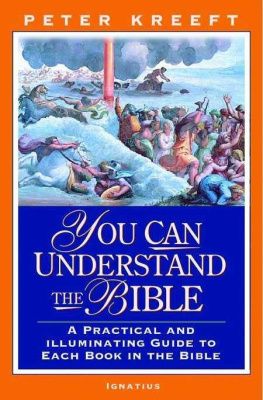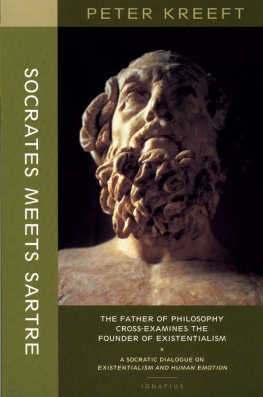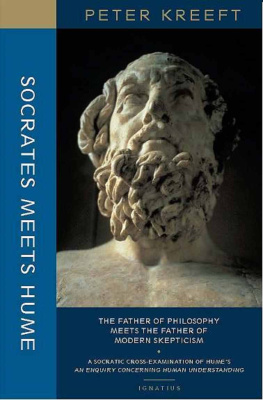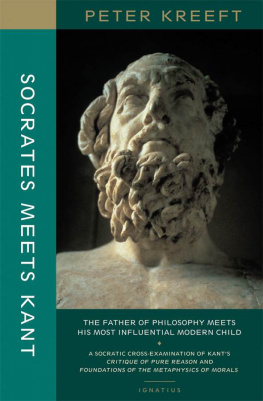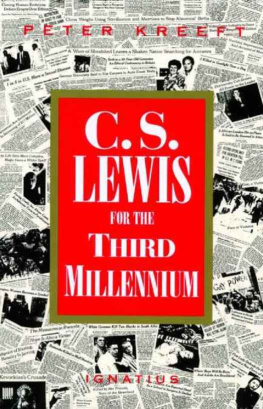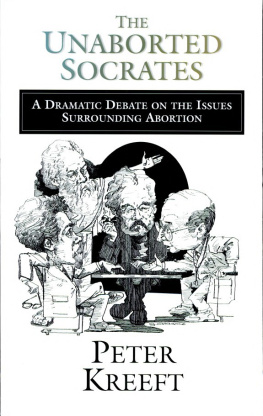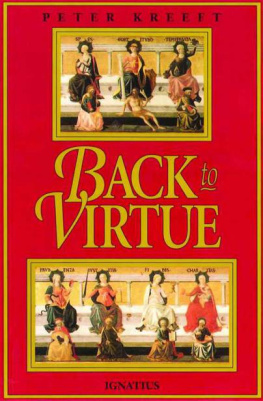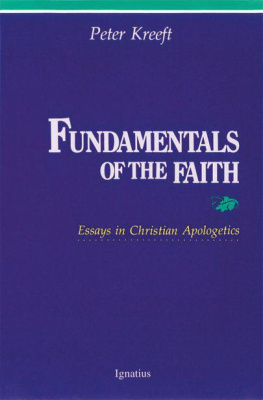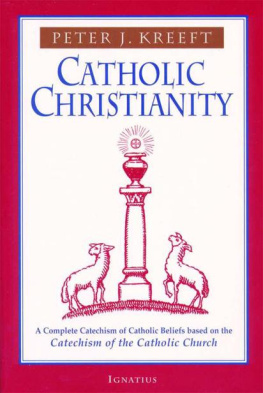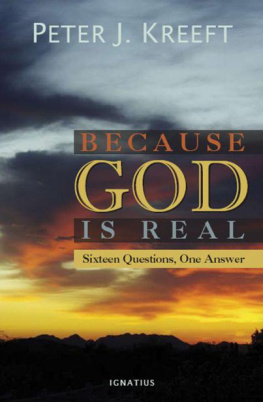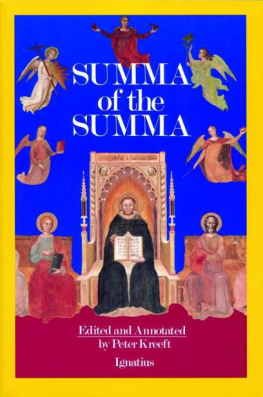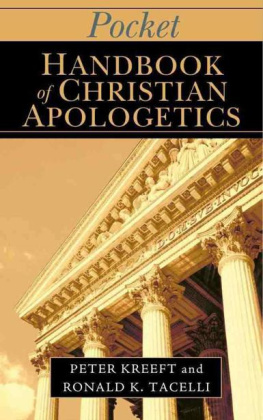Peter Kreeft - Christianity for Modern Pagans: Pascals Pensées
Here you can read online Peter Kreeft - Christianity for Modern Pagans: Pascals Pensées full text of the book (entire story) in english for free. Download pdf and epub, get meaning, cover and reviews about this ebook. year: 2015, publisher: Ignatius Press, genre: Religion. Description of the work, (preface) as well as reviews are available. Best literature library LitArk.com created for fans of good reading and offers a wide selection of genres:
Romance novel
Science fiction
Adventure
Detective
Science
History
Home and family
Prose
Art
Politics
Computer
Non-fiction
Religion
Business
Children
Humor
Choose a favorite category and find really read worthwhile books. Enjoy immersion in the world of imagination, feel the emotions of the characters or learn something new for yourself, make an fascinating discovery.
- Book:Christianity for Modern Pagans: Pascals Pensées
- Author:
- Publisher:Ignatius Press
- Genre:
- Year:2015
- Rating:5 / 5
- Favourites:Add to favourites
- Your mark:
- 100
- 1
- 2
- 3
- 4
- 5
Christianity for Modern Pagans: Pascals Pensées: summary, description and annotation
We offer to read an annotation, description, summary or preface (depends on what the author of the book "Christianity for Modern Pagans: Pascals Pensées" wrote himself). If you haven't found the necessary information about the book — write in the comments, we will try to find it.
Peter Kreeft: author's other books
Who wrote Christianity for Modern Pagans: Pascals Pensées? Find out the surname, the name of the author of the book and a list of all author's works by series.
Christianity for Modern Pagans: Pascals Pensées — read online for free the complete book (whole text) full work
Below is the text of the book, divided by pages. System saving the place of the last page read, allows you to conveniently read the book "Christianity for Modern Pagans: Pascals Pensées" online for free, without having to search again every time where you left off. Put a bookmark, and you can go to the page where you finished reading at any time.
Font size:
Interval:
Bookmark:
CHRISTIANITY FOR MODERN PAGANS
PETER KREEFT
for
MODERN PAGANS
Pascals Penses
Edited, Outlined and Explained
IGNATIUS PRESS SAN FRANCISCO
Selections from Pascals Penses
translated by A. J. Krailsheimer
1966 by A.J. Krailsheimer
London: Penguin Classics, 1966
Used with permission
Cover design by Riz Boncan Marsella
1993 Ignatius Press
All rights reserved
ISBN 978-0-89870-452-5 (PB)
ISBN 978-1-68149-653-5 (E)
Library of Congress catalogue number 93-78533
Printed in the United States of America
19. Why God Hides
Why Scripture Is Obscure; How to Interpret Scripture
I. INTRODUCTION
1. Order (nos. 6, 12, 298)
2. Method (nos. 55, 91, 130, 696, 701, 737, 842, 869)
II. THE PROBLEM: THE HUMAN CONDITION
3. Wretchedness (nos. 401, 403, 75, 412, 53)
4. The Paradox of Greatness and Wretchedness (nos. 613, 629, 678, 121, 54, 131, 200, 113, 114, 115, 116, 117, 119, 122, 127, 149)
5. Vanity (nos. 40, 47, 18, 43, 522, 16, 661, 95, 806, 77, 627, 688, 413, 750, 22, 35, 48)
6. Vanity of Human Justice (nos. 659, 51, 9, 60, 81, 103, 520, 697, 699)
7. Vanity of Human Reason (nos. 410, 21, 542, 821, 44, 551)
8. Vanity of Dogmatism (nos. 709, 33, 131, 406)
9. Vanity of the Philosophers (nos. 84, 140, 141, 142, 143, 533)
10. Alienation: Lost in the Cosmos (nos. 199, 201, 68, 400)
11. Death (nos. 326, 152, 434, 164, 165, 166)
12. Sin, Selfishness, Self-Love (nos. 978, 211, 395, 421, 431, 562, 597, 616, 617, 668, 869)
III. TWO POPULAR PSEUDO-SOLUTIONS
13. Diversion (nos. 70, 132, 133, 134, 136, 773, 641, 137, 139, 414, 57, 622)
14. Indifference (nos. 427, 823, 941, 632, 176, 177, 150, 151)
IV. THE WAY TO A REAL SOLUTION: HOW TO FIND THE TRUTH
15. Passionate Truth-seeking (nos. 154, 156, 158, 160, 193, 386, 405, 429, 463, 631, 739)
16. Three Levels of Reality: Body, Mind and Heart (nos. 308, 377, 407, 613b, 741, 23)
17. The Heart (nos. 110, 423, 424, 751, 975)
18. Faith and Reason (nos. 170, 173, 183, 185, 174, 175, 188, 420, 7, 172, 769)
V. SIX CLUES ALONG THE WAY
19. Why God Hides (nos. 228, 235, 234, 236, 444, 446, 781, 13, 149)
Why Scripture Is Obscure; How to Interpret Scripture (nos. 255, 269, 286, 252)
20. Reliability of Scripture (nos. 332, 303, 310, 322)
21. The Jews (nos. 451, 452, 453, 454)
22. Miracles (nos. 568, 168, 378, 734)
23. Uniqueness of Christianity (nos. 215, 220, 229, 357, 817)
24. How the Christian Key Fits the Human Lock: The Two Essential Truths (nos. 351, 192, 352, 358, 712, 398, 430, 399, 449)
VI. THE TURNING POINT, THE DECISION
25. The Wager (nos. 387, 418, 816, 917)
VII. THE END OF THE ROAD: THE POINT OF IT ALL
26. Christ (nos. 190, 212, 309, 321, 417, 291, 842)
27. The Body of Christ (the Church) (nos. 359, 360, 372, 373, 927,733)
28. The Experience of Christ (nos. 913, 919, 924, 946)
(For an explanation of the boldface type, see p. 21 below.)
I have snored my way through far too many student papers beginning Pascal was born... to even think of beginning this book with the usual biographical trivia. I hope you are reading it (or considering reading it) not to hear some gossip about the life of another person who happened to be Pascal but to taste and maybe swallow some of his wisdom about your life.
The only biographical details that seem to me important for appreciating his thoughts are these:
1. He was a seventeenth-century contemporary of Descartes, the father of modern philosophy, and the only philosopher until the nineteenth century who did not climb onto Descartes new methodological bandwagon, which the eighteenth century misnamed the Enlightenmentnamely, trying to do philosophy and even life by the scientific method.
2. He was himself a great scientist. He did major work in physics and mathematics, especially probability theory, and invented the worlds first working computer, vacuum cleaner and public transportation system. He knew the power of science but also its impotence to make us wise or happy or good.
3. He was a child prodigy, well educated by a wise and loving father.
4. One of his sisters became a nun and a Jansenist. His best friends were Jansenists, but he was not a Jansenist. More of this later (p. 14).
5. He died in his thirties, after a long and painful illness.
6. He had always been a nominal and worldly Catholic but had a second conversion (recorded in pense no. 913, pp. 325-26), which gave direction and vocation to his life. The Penses could never have been written without it.
Enough about Pascal. The point of this book is his book . Or, rather, his nonbook. For in 1662 God in his infinite mercy struck Pascal dead at the tender age of thirty-nine, before he could complete the greatest book of Christian apologetics ever written.
We stand stupefied most of the time at the way God runs the world; but occasionally we get a hint, a little lifting of the curtain and a glimpse backstage. I think we have such a glimpse here. Why didnt God let Pascal finish the book for which the penses are only the scattered notes, like a scholars storm-struck study? Everyone who reads the penses can sense the reason: they are too lively, too alive , to be contained in a book. They are like St. Francis of Assisi rather than like St. Thomas Aquinas.
Chesterton describes the difference:
If we actually saw the two human figures in outline, coming over the hill in their friars gowns, we should find that contrast even comic. It would be like seeing, even afar off, the silhouettes of Don Quixote and Sancho Panza, or of Falstaff and Master Slender. St. Francis was a lean and lively little man; thin as a thread and vibrant as a bowstring; and in his motions like an arrow from the bow. All his life was a series of plunges and scampers: darting after the beggar, dashing naked into the woods, tossing himself into the strange ship, hurling himself into the Sultans tent and offering to hurl himself into the fire. In appearance he must have been like a thin brown skeleton autumn leaf dancing eternally before the wind; but in truth it was he that was the wind.St. Thomas was a huge heavy bull of a man, fat and slow and quiet; very mild and magnanimous but not very sociable; shy, even apart from the humility of holiness; and abstracted, even apart from his occasional and carefully concealed experiences of trance or ecstasy. St. Francis was so fiery and even fidgety that the ecclesiastics before whom he appeared quite suddenly thought he was a madman. St. Thomas was so stolid that the scholars in the schools which he attended regularly thought he was a dunce ( St. Thomas Aquinas , chap. 1).To ask such a man to write an ordinary book is like asking lightning to sit for its portrait.
Yet we have a sort of semibook from St. Francis: the Fioretti , or Little Flowers, the sayings of St. Francis, as the Gospels contain the sayings of Jesus. The penses , though written by Pascal, are more like sayings than a book.
No one of the three greatest teachers and most influential men in historyJesus, Socrates or Buddhaever wrote a word, except in sand (Jn 8:6). I think the reason why is the same reason God didnt let Pascal live long enough to tame the tiger, to string the raw pearls that are the penses into a necklace: their very artlessness is the highest art.
There is a higher and a lower mode of teaching. Books are the lower; living is the higher. Sayings are halfway between. They reflect and approximate the higher, the mode of Christ and Socrates and Buddha. Thats why Socrates is the greatest philosopher, according to St. Thomas ( S.T . III, 42, 4): because he taught like Christ, in the higher mode. Thats why he wrote no books.
Next pageFont size:
Interval:
Bookmark:
Similar books «Christianity for Modern Pagans: Pascals Pensées»
Look at similar books to Christianity for Modern Pagans: Pascals Pensées. We have selected literature similar in name and meaning in the hope of providing readers with more options to find new, interesting, not yet read works.
Discussion, reviews of the book Christianity for Modern Pagans: Pascals Pensées and just readers' own opinions. Leave your comments, write what you think about the work, its meaning or the main characters. Specify what exactly you liked and what you didn't like, and why you think so.

